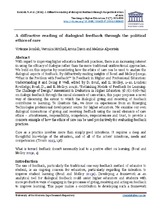A diffractive reading of dialogical feedback through the political ethics of care
Date
2016Author
Bozalek, Vivienne
Mitchell, Veronica
Dison, Arona
Alperstein, Melanie
Metadata
Show full item recordAbstract
With regard to improving higher education feedback practices, there is an increasing interest in using the efficacy of dialogue rather than the more traditional unidirectional approaches. We build on this impetus by considering how the ethics of care can be used to analyse the dialogical aspects of feedback. By diffractively reading insights of Boud and Molloy [2013a. “What is the Problem with Feedback?” In Feedback in Higher and Professional Education: Understanding it and Doing it Well, edited by D. Boud, and E. Molloy, 1–10. London: Routledge; Boud, D., and E. Molloy. 2013b. “Rethinking Models of Feedback for Learning: The Challenge of Design.” Assessment & Evaluation in Higher Education 38 (6): 698–712] on dialogic feedback through the moral elements of care ethics, this paper proposes a novel way of discerning the extent to which the dialogical giving and receiving of feedback contributes to learning. To illustrate this, we draw on experiences from an Emerging Technologies professional development course for higher educators. We examine our own dialogical interactions of giving and receiving feedback using the moral elements of care ethics – attentiveness, responsibility, competence, responsiveness and trust, to provide a concrete example of how the ethics of care can be used productively for evaluating feedback practices.

